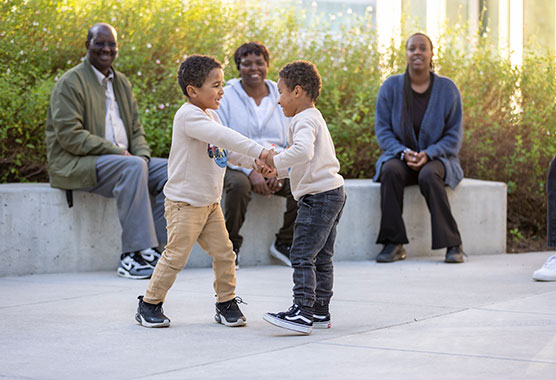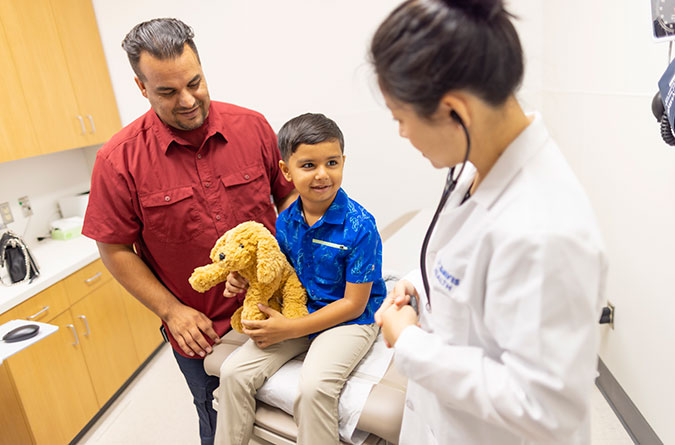Child Development and Behavior
Many conditions can affect how children behave and develop. See how we help children reach their potential.
Medically reviewed by Roger Scott Akins, D.O. on June 21, 2023.

Helping Families Living With Neurodevelopmental Disabilities Thrive
When your child has a developmental delay or behavioral challenges, it can affect the entire family. Our Developmental and Behavioral Pediatrics Division helps children live their best lives. We offer formal developmental assessments and testing as well as care rooted in the latest research and innovations.
Our Difference
Comprehensive Diagnostic Testing
At UC Davis MIND Institute, we offer robust diagnostic testing services. These include medical evaluations and developmental testing for autism, intellectual disability and other neurodevelopmental disabilities.
Research Focus
We are actively involved in advancing care for neurodevelopmental conditions through research and clinical trials. These efforts give children with neurodevelopmental disabilities access to the latest technologies and therapies. Join our research community.
Specialized Clinics
We offer several clinics with specialized expertise in neurodevelopment and behavioral conditions. These clinics care for neonatal intensive care unit (NICU) graduates and children with autism, 22q11.2 deletion syndrome, Down syndrome, intellectual disability, feeding problems and fragile X syndrome.
Types of Neurodevelopmental Disabilities?
Neurodevelopmental disabilities are conditions that affect how children’s brains and nervous systems develop and function. They can affect how children learn, interact, behave and perform everyday tasks.
Most Common Neurodevelopmental Conditions:
Attention Deficit Hyperactivity Disorder (ADHD)
Children with ADHD often have challenges with attention, focusing and impulse control. They may also have excessive bursts of energy or constantly move.
Autism
People with autism have brain differences that can make it hard to communicate and interact with other people. They may also self-soothe with repetitive behaviors.
Intellectual Disabilities
Intellectual disabilities affect how children learn and function. They develop before children turn 18.
Neurogenetic Disorders
Gene or chromosome mutations (changes) can affect how children’s brains develop and function. Neurogenetic disorders happen when children inherit these changes or other factors alter their genes. Neurogenetic conditions tend to be rare and include chromosome 22q11.2 deletion syndrome and fragile X syndrome.
Speech and Motor Delays
Children with speech and motor delays don’t reach speech or motor development milestones as expected. Motor skills involve being able to use your body to do specific tasks and movements, such as writing or jumping.
Causes of Neurodevelopmental Disabilities
Many factors often play a role when your child has a neurodevelopmental disability. While specific gene changes cause neurogenetic disorders, other developmental conditions are associated with a variety of factors.
Top factors include:
Biological Factors
Your health and age when pregnant can affect your child’s development after birth. Research has also linked diabetes, obesity, high blood pressure and infections during pregnancy to developmental challenges. Poor diet and low birthweight can also affect your child’s development and behavior.
Psychosocial Factors
Psychosocial factors include exposure to trauma and abuse. Socioeconomic factors such as poverty, unstable housing and food insecurity also matter.
Environmental Factors
Environmental factors can impact your child’s development before and after birth. Exposure to alcohol, drugs, smoking, certain medications and environmental contaminants like lead may increase your child’s likelihood of developing a neurodevelopmental condition.
Why Diagnosing Neurodevelopmental Disabilities Early Matters
Some neurodevelopment disabilities are present at birth. Others appear later in life. Having a better understanding of how your child learns and what strategies and supports help them can make a big difference. This knowledge can help them gain skills, develop interests and improve their quality of life — and yours.
Early diagnosis means earlier access to care, when a child’s brain is most responsive. It gives you and your child access to therapies, medications and behavioral strategies that can improve symptoms and prepare them for the future.

Request an Appointment
As Sacramento's No. 1 hospital, you'll benefit from unique advantages in primary care and specialty care. This includes prevention, diagnosis and treatment options from experts in 150 specialties.
Referring Physicians
To refer a patient, submit an electronic referral form or call.
800-4-UCDAVIS
Patients
Call to make an appointment.
Consumer Resource Center
800-2-UCDAVIS

Ranked among the nation’s best hospitals
A U.S. News & World Report best hospital in cardiology, heart & vascular surgery, diabetes & endocrinology, ENT, geriatrics, neurology & neurosurgery, and pulmonology & lung surgery.

Ranked among the nation’s best children’s hospitals
U.S. News & World Report ranked UC Davis Children’s Hospital among the best in pediatric nephrology, orthopedics*, and pulmonology & lung surgery. (*Together with Shriners Children’s Northern California)

Ranked Sacramento’s #1 hospital
Ranked Sacramento’s #1 hospital by U.S. News, and high-performing in aortic valve surgery, back surgery (spinal fusion), COPD, colon cancer surgery, diabetes, gynecological cancer surgery, heart arrhythmia, heart failure, kidney failure, leukemia, lymphoma & myeloma, lung cancer surgery, pacemaker implantation, pneumonia, prostate cancer surgery, stroke, TAVR, cancer, orthopedics, gastroenterology & GI surgery, and urology.

The nation’s highest nursing honor
UC Davis Medical Center has received Magnet® recognition, the nation’s highest honor for nursing excellence.

World-class cancer care
One of ~59 U.S. cancer centers designated “comprehensive” by the National Cancer Institute.

A leader in health care equality
For the 13th consecutive year, UC Davis Medical Center has been recognized as an LGBTQ+ Healthcare Equality Leader by the educational arm of America’s largest civil rights organization.

